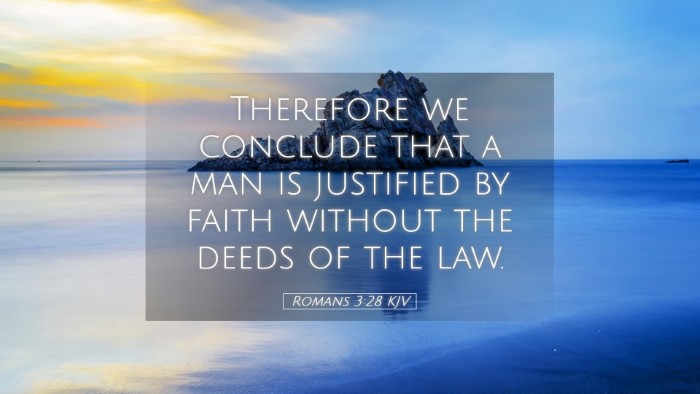Insights and Analysis
The Apostle Paul, in his epistle to the Romans, focuses extensively on the theme of justification by faith. Romans 3:28 serves as a pivotal verse in this discourse, encapsulating the essence of salvation as not being dependent on the law but rather on faith in Jesus Christ.
Matthew Henry's Commentary:
- Henry emphasizes that the phrase "we conclude" reflects a collective understanding among Christians about the nature of justification. This conclusion is born out of a theological framework formed by the preceding discussions in Romans, particularly concerning sin and grace.
- Henry notes that justification stems from faith and is not determined by adherence to the law. He points out that this signifies a shift from legalistic righteousness to one based on faith, which is freely available to all who believe, transcending cultural and ethnic boundaries.
Albert Barnes' Notes:
- Barnes discusses the implications of "justified by faith" and highlights that justification is a legal term denoting the act of being declared righteous in the sight of God. He argues that this declaration is based solely on one’s acceptance of Christ and not on any legalistic observance.
- Furthermore, Barnes mentions that Paul presents faith as the only means through which believers can attain righteousness, thereby establishing the doctrine that human efforts, regardless of their magnitude, are inadequate for salvation.
Adam Clarke's Commentary:
- Clarke elaborates on the contextual significance of this verse. He insists that Paul seeks to reaffirm that justification is not about ritualistic law observance but is a matter of the heart. The law was incapable of saving anyone before the coming of Christ.
- He also points out that the term "without the deeds of the law" reaffirms the notion that faith alone is sufficient for salvation, thereby opposing the works-based righteousness that some factions of Judaism espoused during Paul’s time.
Theological Implications
This verse, and its elucidation, carries significant theological weight. It lays down the foundation of Protestant Reformation teachings concerning salvation. The principle that justification is through faith alone (Sola Fide) serves as a cornerstone for many denominations today.
Application for Believers
For pastors, students, and theologians, Romans 3:28 prompts a reflection on the nature of faith and works within the life of the believer. The dichotomy presented challenges modern Christians to understand that true justification can only come through faith, which should cultivate a deep assurance in their relationship with God.
Conclusion
Ultimately, Romans 3:28 calls for a deep engagement with the grace of God manifest through faith in Christ. Comprehending this pivotal truth not only enriches theological understanding but also promotes a vibrant faith that rests in the sufficiency of Christ's sacrifice rather than in human efforts.


